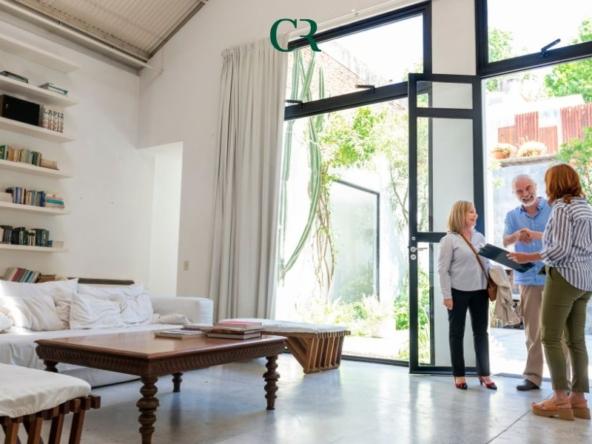A complete home renovation is a significant project that can transform your space, improve your quality of life, and increase the property’s value.
Below, I provide a complete guide on everything you need to know to carry out a successful full renovation.
What to consider before starting a renovation?
1. Initial Planning:
– Define Objectives: Clarify what your needs and desires are. Do you want more space, modernize the style, improve energy efficiency, or update old installations?
– Budget: Set a realistic budget. It is recommended to reserve an additional 10-20% for unforeseen expenses.
– Timeline: Define a timeline for the renovation. This can vary depending on the magnitude of the project, but a complete renovation can take from 3 to 6 months, or even longer.
– Permits and Licenses: Research the necessary permits for the renovation. Depending on the scale of the project, you may need a major or minor building permit, which should be requested at the town hall.
2. Design and Layout:
– Hire an Architect or Designer: An architect or interior designer can help you optimize the space layout and create a design that reflects your needs and tastes.
– Space Layout: Review the current layout of your home and consider whether you need to tear down walls, create open spaces, or add rooms.
– Style and Materials: Decide on the style (modern, rustic, minimalist, etc.) and the materials you want to use. It is important to choose durable and high-quality materials.
– Sustainability: Consider integrating sustainable solutions, such as thermal insulation, renewable energy systems (solar panels), and water-efficient fixtures.
3. Selection of Professionals:
– Hire a Builder or Renovation Company: Choose a renovation company or builder with experience and good references. Request several detailed quotes to compare.
– Supervision and Coordination: If you don’t have experience in renovations, consider hiring a project manager to oversee and coordinate the work of the various professionals (builders, electricians, plumbers, carpenters, etc.).
– Review Contracts: Make sure the contract with the renovation company includes all aspects of the project, such as the total cost, timeline, materials, and payment terms.
4. Construction Phase:
– Demolitions and Preparations: The first phase typically involves demolishing old structures and preparing the space for new construction.
– Basic Installations: Plumbing pipes, electrical systems, heating, and air conditioning are renewed or newly installed. This is a crucial step as it ensures the safety and efficiency of your home.
– Structures and Finishes: New walls are built, floors, windows, doors are installed, and painting and cladding work is carried out.
– Kitchen and Bathrooms: These areas usually require special attention due to the installation of furniture, faucets, and appliances. Be sure to choose materials that are resistant to moisture and wear.
5. Final Details:
– Lighting: The installation of lighting is crucial for the atmosphere of your home. Consider different types of lighting (general, accent, ambient) for each room.
– Furniture and Decoration: Once the structural work is finished, you can begin to furnish and decorate your home. This is where your personal style is reflected.
– Final Inspection: Perform a detailed inspection to ensure everything is in order. Make a list of pending details or necessary corrections and agree with the renovation company on a deadline to complete them.
6. Maintenance and Warranties:
– Warranties: Make sure the work done is covered by warranties. Renovation companies typically offer a 1 to 3-year warranty for the work carried out.
– Regular Maintenance: Once the renovation is complete, establish a maintenance plan to ensure your home stays in good condition. This includes regularly checking electrical and plumbing installations, as well as the condition of the materials.
7. Cost and Financing:
– Cost Estimate: The cost of a complete renovation can vary significantly depending on the size of the home, the materials chosen, and the complexity of the project. In general, the cost per square meter can range from 500 to 1,500 euros.
– Financing: If you need financing, you can consider applying for a personal loan, extending your existing mortgage, or using savings. Some banks offer specific loans for renovations with favorable conditions.
– Cost Optimization*: To optimize the budget, prioritize improvements that add the most value to your home, such as the kitchen, bathrooms, and energy efficiency.
8. Legal and Tax Aspects:
– Grants and Deductions: Research if there are grants or tax deductions for renovations, especially those related to improving energy efficiency or accessibility.
– Update the Land Registry: If you make significant structural changes, you may need to update the land registry data for your property.
– Insurance: Inform your insurance company about the renovation to adjust the home policy and ensure that the coverage is adequate.
Additional Tips
– Open Communication: Keep open communication with the professionals throughout the process. Make sure to stay informed about the progress and resolve any issues immediately.
– Flexibility: Renovations may present unforeseen issues. It is important to be flexible and prepared to adjust the plan if necessary.
– Budget Control: Keep a detailed track of expenses to avoid surprises and ensure that the expenses align with the initial budget.
A complete home renovation is an ambitious process, but with proper planning and the right choice of professionals, you can transform your house into the home of your dreams.







